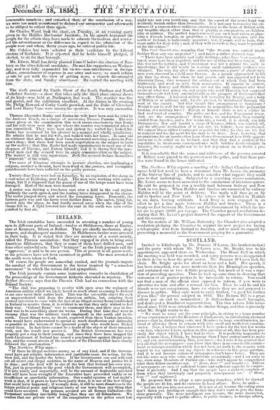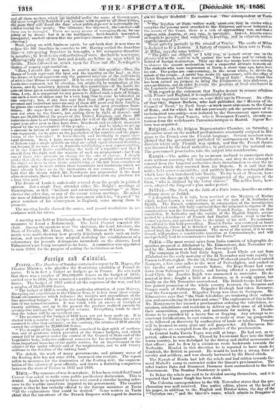SCOTLAND.
Invited to Edinburgh by Mr. Duncan M`Laren, (his brother-in-law) and the party with whom Mr. M'Laren acts, Mr. Bright, true to his. appointment, appeared there on 'Wednesday. The Music Hall in which the meeting was held Was crowded, and many persons were disappointed in their desire to hear the great orator. Mr. Duncan M'Laren took the chair. Mr. Bright spoke for about an hour and a half. His speech, it has been remarked, was more moderate than his Birmingham speeches, and contained one or two definite proposals, but much of it was a repe- tion of preceding speeches. Thus be took up some time in showing that statesmen of all parties profess to be favourable to reform. You could not find a man of the official class opposed to reform, if you were to advertise for him and offer a reward for him. Then he said he and his friends were not conspirators, have no objects they are not prepared to discuss in public. They only want to carry further, "a good bit further if you like," the process adopted in 1832. The Reform Bill to a great extent put an end to nomination ; it disfranchised small boroughs, and destroyed a fraudulent representation. The two reform bills intro- duced since 1832 were intended to do similar things, and that is precisely what Mr. Bright wants to do. " We want to carry out the same principle, in giving to a large number of our countrymen votes for Members of Parliament, in distributing electoral power--that is, distributing seats and Members to large constituencies, in- stead of allowing them to remain with very small and inefficient constitu- encies. Now, I believe that wherever I have spoken for the last few weeks —in fact, wherever I have spoken on this question at all, this has been pre- cisely the object which I have had in view. It is perfectly impossible to make it more clear, I think, by language than I have endeavoured to make it ; and yet, notwithstanding that, you know—for I take it for granted that you all read the newspapers—you know that there is no conceivable mistate- ment or misrepresentation which has not been set forth to the country with regard to my opinions and my objects in reference to this grout question. And it is not because etitors of newspapers don't know better. They are not like sonic inen who come on platforms occasionally—and I um sorry to say, even some Members of Parlirunent—who don't appear to comprehend what their fellow-members say. (" Hear, hear !" and laughttr.) Editors of newspapers are men of sufficient brains and sufficient sagacity to compre- hend it. perfectly. And I say that the people have a right to complain of them when they knowingly and purposely misrepresent me." ("Hear, hear !" and applause.)
He proposes first to adopt a rate-paying franchise, which he showed the people are fit for, and do exercise in local affairs. Here, he said- " Let me let you into one secret. It is not at all because the ruling class don't think you intelligent enough that they don't want to give the fran- chise generally. The more intelligent you become, the more instructed, especially with regard to public affairs, to public finance, to foreign affairs,
111)spaematterii.231e.144.114isthitirTthe oame .of proversivient, f ord'ethri Wyeti,..1) odunvIthiligtirfrtO' iffeethidgat
• nitirfl . t119 Mile* eit:$8ThitaW3lier
t ftflg the ittePlei' Titer illtenegto. llieltatipravIed,-thekt4e1CsiP" Alt these can be managed. There are many means of managing thern4,1ryirete jaIntlfloi• by 'forces s•bistrit i the intelligent' hardheaded instrusted, thtughtful, •resolute eitiaeri that the privileged claases'denq . :(Gravdt chitieriv..)1 • . r Next; going on with business again, he set forth that-it wan time to reduce the 507: franchise in,counties to 10/. -Having settleflIthe fratchis.e gis—a rate-paying franehise in boreugha, 'a 107.- dectiphineysfratiehiee i .bouaties ; he went ti the redistribution of seatS, • Entlierate wtüè iug.-only that all the ,faets, end details are before us uPon.whicli çt . Thenan
attaek. epee...the /Yews' and Mr. Newdeeete's • .
of comity represeutatiou.
'F. ow, I shouli. like. suys man. to answer me this question--DOes. tim Higlikee,of Lords represesit, the land end Use teoantry on thm. land or dees thttgettee el .Lords represent only. the parse. final ietercets of the individuals ofoehielh t1ott Ilouse is composed r If it lasouce.ailtuitted that the House of Leroltdoes,repreeent. nat by•ieleetion, buteeiinsilly. by nemination of the Crowns and by ,latirealitary descent from .tliat neesination—if the Lords. re, pewee:111w ;great territorial lidercats in, dr tpper House _ef Parliateent, then, I say, skis oompetent for any person. es de.f.enil such a state of things, assdnuohn state of things .,may for a very lerig time to cinee be tolerated in this wintry.; but, if any man says that these 400 peers represent the perannoland instivideal interest e only oftheae,4,00. peers and their families, tiClIsinens-the existence of the•ilenell of Lords on the most precarious foun- dation. .Heesitye—here are .400. men, elsesen, net by, the people—chosen newencitseven, by, the Crown,, but .sitting there by .right, of descent—and ilAerft ase.30,000;000,of the people of the 1,Tuited. Kingdom, aud these 400 individuals dare, to set themselves against the will of the 30,00.0,000, and to reject year after year as they h,ave done, heneheent and excellent Incas:ere:I passed by the ropeesentatives of the people And he wishes to get up a glamour iu.favour of more county members, what (lees Mead to,- on his own argument, for he gives us the population of the counties and the popu- lation of the boroughs ? It leads directly and inevitably to equal ewe- toial districts. Now, I . have never since I wrote or spoke on the question of Reform said a single syllable:on what are called Clithkl electoral districts.i not because if we were now in Australia establishing a new representation, or inthe United States establishing the basis Of a republic—not that •I should deny the right and the wisdom of such an arrangement-s-butlain one of those who advocate no change for the sake of chauge. I should prefer that all the changes that we make; 'so far es• 'possibly consistent With the object we have in view in the establishing of the fair representation of the people, max' be made within those boundaries and landmarks which we have already before us in the institutions of our country. (Cluvrai) •I hold that the theory which Mr. Newdegate has propounded is the most ultresdemocratic theory that I have heard explained from any platform for a long time past." • The House of Lords is sufficiently severed from the people in political opinion. Not a single Peer attended either Mr. Blight's meetings at Birmingham, or that "brilliant and astonishing assemblage" at Man- chester the other day, or any of the recent reform meetings. He asked the men of Edinburgh to join in the movement which he, "deputed" by great numbers of his countrymen in England, came among them to promote.
The meeting loudly cheered the orator, and passed resolutions in ac- cordance with his "Views.
A meeting was held at Edinburgh on Monday for the purpose of taking measures to fuund a Reformatory. The Lord Provost occupied the chair. Among the speakers were the chairman, the Lord Advocate, the Dean of Faculty, Mr. Adam Black, and Mr. Duncan 3I'Laren. State- ments were made showing how greatly Edinburgh needs such an insti- tution, and resolutions were adopted declaring the establishment of a reformatory for juvenile delinquents incumbent on the citizens, Lord Palmerston's act being accepted as its basis. A committee was appointed to raise 20001. for the purpose of setting the institution on foot.



























 Previous page
Previous page